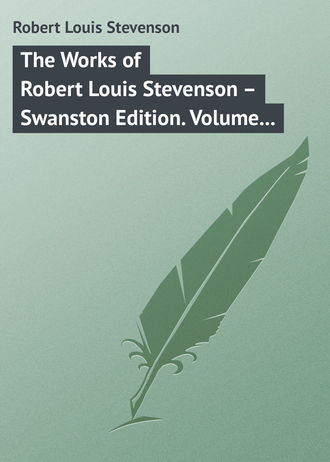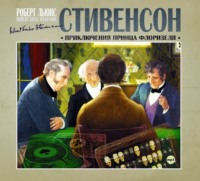 полная версия
полная версияThe Works of Robert Louis Stevenson – Swanston Edition. Volume 16
C. “Of Damien I begin to have an idea. He seems to have been a man of the peasant class, certainly of the peasant type: shrewd; ignorant and bigoted, yet with an open mind, and capable of receiving and digesting a reproof if it were bluntly administered; superbly generous in the least thing as well as in the greatest, and as ready to give his last shirt (although not without human grumbling) as he had been to sacrifice his life; essentially indiscreet and officious, which made him a troublesome colleague; domineering in all his ways, which made him incurably unpopular with the Kanakas, but yet destitute of real authority, so that his boys laughed at him and he must carry out his wishes by the means of bribes. He learned to have a mania for doctoring; and set up the Kanakas against the remedies of his regular rivals: perhaps (if anything matter at all in the treatment of such a disease) the worst thing that he did, and certainly the easiest. The best and worst of the man appear very plainly in his dealings with Mr. Chapman’s money; he had originally laid it out” [intended to lay it out] “entirely for the benefit of Catholics, and even so not wisely; but after a long, plain talk, he admitted his error fully and revised the list. The sad state of the boys’ home is in part the result of his lack of control; in part, of his own slovenly ways and false ideas of hygiene. Brother officials used to call it ‘Damien’s Chinatown.’ ‘Well,’ they would say, ‘your Chinatown keeps growing.’ And he would laugh with perfect good-nature, and adhere to his errors with perfect obstinacy. So much I have gathered of truth about this plain, noble human brother and father of ours; his imperfections are the traits of his face, by which we know him for our fellow; his martyrdom and his example nothing can lessen or annul; and only a person here on the spot can properly appreciate their greatness.”
I have set down these private passages, as you perceive, without correction; thanks to you, the public has them in their bluntness. They are almost a list of the man’s faults, for it is rather these that I was seeking: with his virtues, with the heroic profile of his life, I and the world were already sufficiently acquainted. I was besides a little suspicious of Catholic testimony; in no ill sense, but merely because Damien’s admirers and disciples were the least likely to be critical. I know you will be more suspicious still; and the facts set down above were one and all collected from the lips of Protestants who had opposed the father in his life. Yet I am strangely deceived, or they build up the image of a man, with all his weaknesses, essentially heroic, and alive with rugged honesty, generosity, and mirth.
Take it for what it is, rough private jottings of the worst sides of Damien’s character, collected from the lips of those who had laboured with and (in your own phrase) “knew the man”; – though I question whether Damien would have said that he knew you. Take it, and observe with wonder how well you were served by your gossips, how ill by your intelligence and sympathy; in how many points of fact we are at one, and how widely our appreciations vary. There is something wrong here; either with you or me. It is possible, for instance, that you, who seem to have so many ears in Kalawao, had heard of the affair of Mr. Chapman’s money, and were singly struck by Damien’s intended wrong-doing. I was struck with that also, and set it fairly down; but I was struck much more by the fact that he had the honesty of mind to be convinced. I may here tell you that it was a long business; that one of his colleagues sat with him late into the night, multiplying arguments and accusations; that the father listened as usual with “perfect good-nature and perfect obstinacy”; but at the last, when he was persuaded – “Yes,” said he, “I am very much obliged to you; you have done me a service; it would have been a theft.” There are many (not Catholics merely) who require their heroes and saints to be infallible; to these the story will be painful; not to the true lovers, patrons, and servants of mankind.
And I take it, this is a type of our division; that you are one of those who have an eye for faults and failures; that you take a pleasure to find and publish them; and that, having found them, you make haste to forget the overvailing virtues and the real success which had alone introduced them to your knowledge. It is a dangerous frame of mind. That you may understand how dangerous, and into what a situation it has already brought you, we will (if you please) go hand-in-hand through the different phrases of your letter, and candidly examine each from the point of view of its truth, its appositeness, and its charity.
Damien was coarse.
It is very possible. You make us sorry for the lepers who had only a coarse old peasant for their friend and father. But you, who were so refined, why were you not there, to cheer them with the lights of culture? Or may I remind you that we have some reason to doubt if John the Baptist were genteel; and in the case of Peter, on whose career you doubtless dwell approvingly in the pulpit, no doubt at all he was a “coarse, headstrong” fisherman! Yet even in our Protestant Bibles Peter is called Saint.
Damien was dirty.
He was. Think of the poor lepers annoyed with this dirty comrade! But the clean Dr. Hyde was at his food in a fine house.
Damien was headstrong.
I believe you are right again; and I thank God for his strong head and heart.
Damien was bigoted.
I am not fond of bigots myself, because they are not fond of me. But what is meant by bigotry, that we should regard it as a blemish in a priest? Damien believed his own religion with the simplicity of a peasant or a child; as I would I could suppose that you do. For this, I wonder at him some way off; and had that been his only character, should have avoided him in life. But the point of interest in Damien, which has caused him to be so much talked about and made him at last the subject of your pen and mine, was that, in him, his bigotry, his intense and narrow faith, wrought potently for good, and strengthened him to be one of the world’s heroes and exemplars.
Damien was not sent to Molokai, but went there without orders.
Is this a misreading? or do you really mean the words for blame? I have heard Christ, in the pulpits of our Church, held up for imitation on the ground that His sacrifice was voluntary. Does Dr. Hyde think otherwise?
Damien did not stay at the settlement, etc.
It is true he was allowed many indulgences. Am I to understand that you blame the father for profiting by these, or the officers for granting them? In either case, it is a mighty Spartan standard to issue from the house on Beretania Street; and I am convinced you will find yourself with few supporters.
Damien had no hand in the reforms, etc.
I think even you will admit that I have already been frank in my description of the man I am defending; but before I take you up upon this head, I will be franker still, and tell you that perhaps nowhere in the world can a man taste a more pleasurable sense of contrast than when he passes from Damien’s “Chinatown” at Kalawao to the beautiful Bishop-Home at Kalaupapa. At this point, in my desire to make all fair for you, I will break my rule and adduce Catholic testimony. Here is a passage from my diary about my visit to the Chinatown, from which you will see how it is (even now) regarded by its own officials: “We went round all the dormitories, refectories, etc. – dark and dingy enough, with a superficial cleanliness, which he” [Mr. Dutton, the lay brother] “did not seek to defend. ‘It is almost decent,’ said he; ‘the sisters will make that all right when we get them here.’” And yet I gathered it was already better since Damien was dead, and far better than when he was there alone and had his own (not always excellent) way. I have now come far enough to meet you on a common ground of fact; and I tell you that, to a mind not prejudiced by jealousy, all the reforms of the lazaretto, and even those which he most vigorously opposed, are properly the work of Damien. They are the evidence of his success; they are what his heroism provoked from the reluctant and the careless. Many were before him in the field; Mr. Meyer, for instance, of whose faithful work we hear too little: there have been many since; and some had more worldly wisdom, though none had more devotion, than our saint. Before his day, even you will confess, they had effected little. It was his part, by one striking act of martyrdom, to direct all men’s eyes on that distressful country. At a blow, and with the price of his life, he made the place illustrious and public. And that, if you will consider largely, was the one reform needful; pregnant of all that should succeed. It brought money; it brought (best individual addition of them all) the sisters; it brought supervision, for public opinion and public interest landed with the man at Kalawao. If ever any man brought reforms, and died to bring them, it was he. There is not a clean cup or towel in the Bishop-Home, but dirty Damien washed it.
Damien was not a pure man in his relations with women, etc.
How do you know that? Is this the nature of the conversation in that house on Beretania Street which the cabman envied, driving past? – racy details of the misconduct of the poor peasant priest, toiling under the cliffs of Molokai?
Many have visited the station before me; they seem not to have heard the rumour. When I was there I heard many shocking tales, for my informants were men speaking with the plainness of the laity; and I heard plenty of complaints of Damien. Why was this never mentioned? and how came it to you in the retirement of your clerical parlour?
But I must not even seem to deceive you. This scandal, when I read it in your letter, was not new to me. I had heard it once before; and I must tell you how. There came to Samoa a man from Honolulu; he in a public-house on the beach volunteered the statement that Damien had “contracted the disease from having connection with the female lepers”; and I find a joy in telling you how the report was welcomed in a public-house. A man sprang to his feet; I am not at liberty to give his name, but from what I heard I doubt if you would care to have him to dinner in Beretania Street. “You miserable little – ” (here is a word I dare not print, it would so shock your ears). “You miserable little – ,” he cried, “if the story were a thousand times true, can’t you see you are a million times a lower – for daring to repeat it?” I wish it could be told of you that when the report reached you in your house, perhaps after family worship, you had found in your soul enough holy anger to receive it with the same expressions; ay, even with that one which I dare not print; it would not need to have been blotted away, like Uncle Toby’s oath, by the tears of the recording angel; it would have been counted to you for your brightest righteousness. But you have deliberately chosen the part of the man from Honolulu, and you have played it with improvements of your own. The man from Honolulu – miserable, leering creature – communicated the tale to a rude knot of beach-combing drinkers in a public-house, where (I will so far agree with your temperance opinions) man is not always at his noblest; and the man from Honolulu had himself been drinking – drinking, we may charitably fancy, to excess. It was to your “Dear Brother, the Reverend H. B. Gage,” that you chose to communicate the sickening story; and the blue ribbon which adorns your portly bosom forbids me to allow you the extenuating plea that you were drunk when it was done. Your “dear brother” – a brother indeed – made haste to deliver up your letter (as a means of grace, perhaps) to the religious papers; where, after many months, I found and read and wondered at it; and whence I have now reproduced it for the wonder of others. And you and your dear brother have, by this cycle of operations, built up a contrast very edifying to examine in detail. The man whom you would not care to have to dinner, on the one side; on the other, the Reverend Dr. Hyde and the Reverend H. B. Gage: the Apia bar-room, the Honolulu manse.
But I fear you scarce appreciate how you appear to your fellow-men; and to bring it home to you, I will suppose your story to be true. I will suppose – and God forgive me for supposing it – that Damien faltered and stumbled in his narrow path of duty; I will suppose that, in the horror of his isolation, perhaps in the fever of incipient disease, he, who was doing so much more than he had sworn, failed in the letter of his priestly oath – he, who was so much a better man than either you or me, who did what we have never dreamed of daring – he too tasted of our common frailty. “O, Iago, the pity of it!” The least tender should be moved to tears; the most incredulous to prayer. And all that you could do was to pen your letter to the Reverend H. B. Gage!
Is it growing at all clear to you what a picture you have drawn of your own heart? I will try yet once again to make it clearer. You had a father: suppose this tale were about him, and some informant brought it to you, proof in hand: I am not making too high an estimate of your emotional nature when I suppose you would regret the circumstance? that you would feel the tale of frailty the more keenly since it shamed the author of your days? and that the last thing you would do would be to publish it in the religious press? Well, the man who tried to do what Damien did is my father, and the father of the man in the Apia bar, and the father of all who love goodness; and he was your father too, if God had given you grace to see it.
XI
MY FIRST BOOK – “TREASURE ISLAND”
It was far indeed from being my first book, for I am not a novelist alone. But I am well aware that my paymaster, the Great Public, regards what else I have written with indifference, if not aversion; if it call upon me at all, it calls on me in the familiar and indelible character; and when I am asked to talk of my first book, no question in the world but what is meant is my first novel.
Sooner or later, somehow, anyhow, I was bound to write a novel. It seems vain to ask why. Men are born with various manias: from my earliest childhood it was mine to make a plaything of imaginary series of events; and as soon as I was able to write, I became a good friend to the papermakers. Reams upon reams must have gone to the making of “Rathillet,” “The Pentland Rising,”33 “The King’s Pardon” (otherwise “Park Whitehead”), “Edward Daven,” “A Country Dance,” and “A Vendetta in the West”; and it is consolatory to remember that these reams are now all ashes, and have been received again into the soil. I have named but a few of my ill-fated efforts, only such indeed as came to a fair bulk ere they were desisted from; and even so they cover a long vista of years. “Rathillet” was attempted before fifteen, “The Vendetta” at twenty-nine, and the succession of defeats lasted unbroken till I was thirty-one. By that time I had written little books and little essays and short stories; and had got patted on the back and paid for them – though not enough to live upon. I had quite a reputation, I was the successful man; I passed my days in toil, the futility of which would sometimes make my cheek to burn – that I should spend a man’s energy upon this business, and yet could not earn a livelihood: and still there shone ahead of me an unattained ideal: although I had attempted the thing with vigour not less than ten or twelve times, I had not yet written a novel. All – all my pretty ones – had gone for a little, and then stopped inexorably like a schoolboy’s watch. I might be compared to a cricketer of many years’ standing who should never have made a run. Anybody can write a short story – a bad one, I mean – who has industry and paper and time enough; but not every one may hope to write even a bad novel. It is the length that kills. The accepted novelist may take his novel up and put it down, spend days upon it in vain, and write not any more than he makes haste to blot. Not so the beginner. Human nature has certain rights; instinct – the instinct of self-preservation – forbids that any man (cheered and supported by the consciousness of no previous victory) should endure the miseries of unsuccessful literary toil beyond a period to be measured in weeks. There must be something for hope to feed upon. The beginner must have a slant of wind, a lucky vein must be running, he must be in one of those hours when the words come and the phrases balance of themselves —even to begin. And having begun, what a dread looking forward is that until the book shall be accomplished! For so long a time the slant is to continue unchanged, the vein to keep running, for so long a time you must keep at command the same quality of style: for so long a time your puppets are to be always vital, always consistent, always vigorous! I remember I used to look, in those days, upon every three-volume novel with a sort of veneration, as a feat – not, possibly, of literature – but at least of physical and moral endurance and the courage of Ajax.
In the fated year I came to live with my father and mother at Kinnaird, above Pitlochry. Then I walked on the red moors and by the side of the golden burn; the rude, pure air of our mountains inspirited, if it did not inspire, us, and my wife and I projected a joint volume of bogey stories, for which she wrote “The Shadow on the Bed,” and I turned out “Thrawn Janet” and a first draft of “The Merry Men.” I love my native air, but it does not love me; and the end of this delightful period was a cold, a fly-blister and a migration by Strathardle and Glenshee to the Castleton of Braemar. There it blew a good deal and rained in a proportion; my native air was more unkind than man’s ingratitude, and I must consent to pass a good deal of my time between four walls in a house lugubriously known as the Late Miss McGregor’s Cottage. And now admire the finger of predestination. There was a schoolboy in the Late Miss McGregor’s Cottage, home from the holidays, and much in want of “something craggy to break his mind upon.” He had no thought of literature; it was the art of Raphael that received his fleeting suffrages; and with the aid of pen and ink and a shilling box of watercolours, he had soon turned one of the rooms into a picture-gallery. My more immediate duty towards the gallery was to be showman; but I would sometimes unbend a little, join the artist (so to speak) at the easel, and pass the afternoon with him in a generous emulation, making coloured drawings. On one of these occasions, I made the map of an island; it was elaborately and (I thought) beautifully coloured; the shape of it took my fancy beyond expression; it contained harbours that pleased me like sonnets; and, with the unconsciousness of the predestined, I ticketed my performance “Treasure Island.” I am told there are people who do not care for maps, and find it hard to believe. The names, the shapes of the woodlands, the courses of the roads and rivers, the prehistoric footsteps of man still distinctly traceable up hill and down dale, the mills and the ruins, the ponds and the ferries, perhaps the Standing Stone or the Druidic Circle on the heath; here is an inexhaustible fund of interest for any man with eyes to see or twopence-worth of imagination to understand with! No child but must remember laying his head in the grass, staring into the infinitesimal forest and seeing it grow populous with fairy armies. Somewhat in this way, as I paused upon my map of “Treasure Island,” the future character of the book began to appear there visibly among imaginary woods; and their brown faces and bright weapons peeped out upon me from unexpected quarters, as they passed to and fro, fighting and hunting treasure, on these few square inches of a flat projection. The next thing I knew I had some papers before me and was writing out a list of chapters. How often have I done so, and the thing gone on further! But there seemed elements of success about this enterprise. It was to be a story for boys: no need of psychology or fine writing; and I had a boy at hand to be a touchstone. Women were excluded. I was unable to handle a brig (which the Hispaniola should have been), but I thought I could make shift to sail her as a schooner without public shame. And then I had an idea for John Silver from which I promised myself funds of entertainment: to take an admired friend of mine (whom the reader very likely knows and admires as much as I do), to deprive him of all his finer qualities and higher graces of temperament, to leave him with nothing but his strength, his courage, his quickness, and his magnificent geniality, and to try to express these in terms of the culture of a raw tarpaulin. Such psychical surgery is, I think, a common way of “making character”; perhaps it is, indeed, the only way. We can put in the quaint figure that spoke a hundred words with us yesterday by the wayside; but do we know him? Our friend with his infinite variety and flexibility, we know – but can we put him in? Upon the first, we must engraft secondary and imaginary qualities, possibly all wrong; from the second, knife in hand, we must cut away and deduct the needless arborescence of his nature, but the trunk and the few branches that remain we may at least be fairly sure of.
On a chill September morning, by the cheek of a brisk fire, and the rain drumming on the window, I began “The Sea Cook,” for that was the original title. I have begun (and finished) a number of other books, but I cannot remember to have sat down to one of them with more complacency. It is not to be wondered at, for stolen waters are proverbially sweet. I am now upon a painful chapter. No doubt the parrot once belonged to Robinson Crusoe. No doubt the skeleton is conveyed from Poe. I think little of these, they are trifles and details; and no man can hope to have a monopoly of skeletons or make a corner in talking birds. The stockade, I am told, is from “Masterman Ready.” It may be, I care not a jot. These useful writers had fulfilled the poet’s saying: departing, they had left behind them Footprints on the sands of time, Footprints which perhaps another – and I was the other! It is my debt to Washington Irving that exercises my conscience, and justly so, for I believe plagiarism was rarely carried further. I chanced to pick up the “Tales of a Traveller” some years ago with a view to an anthology of prose narrative, and the book flew up and struck me: Billy Bones, his chest, the company in the parlour, the whole inner spirit, and a good deal of the material detail of my first chapters – all were there, all were the property of Washington Irving. But I had no guess of it then as I sat writing by the fireside, in what seemed the spring-tides of a somewhat pedestrian inspiration; nor yet day by day, after lunch, as I read aloud my morning’s work to the family. It seemed to me original as sin; it seemed to belong to me like my right eye. I had counted on one boy, I found I had two in my audience. My father caught fire at once with all the romance and childishness of his original nature. His own stories, that every night of his life he put himself to sleep with, dealt perpetually with ships, roadside inns, robbers, old sailors, and commercial travellers before the era of steam. He never finished one of these romances; the lucky man did not require to finish them! But in “Treasure Island” he recognised something kindred to his own imagination; it was his kind of picturesque; and he not only heard with delight the daily chapter, but set himself acting to collaborate. When the time came for Billy Bones’s chest to be ransacked, he must have passed the better part of a day preparing, on the back of a legal envelope, an inventory of its contents, which I exactly followed; and the name of “Flint’s old ship” – the Walrus– was given at his particular request. And now who should come dropping in, ex machinâ, but Dr. Japp, like the disguised prince who is to bring down the curtain upon peace and happiness in the last act; for he carried in his pocket, not a horn or a talisman, but a publisher. Even the ruthlessness of a united family recoiled before the extreme measure of inflicting on our guest the mutilated members of “The Sea Cook”; at the same time, we would by no means stop our readings; and accordingly the tale was begun again at the beginning, and solemnly re-delivered for the benefit of Dr. Japp. From that moment on, I have thought highly of his critical faculty; for when he left us he carried away the manuscript in his portmanteau to submit to his friend (since then my own) Mr. Henderson, who accepted it for his periodical, Young Folks.









